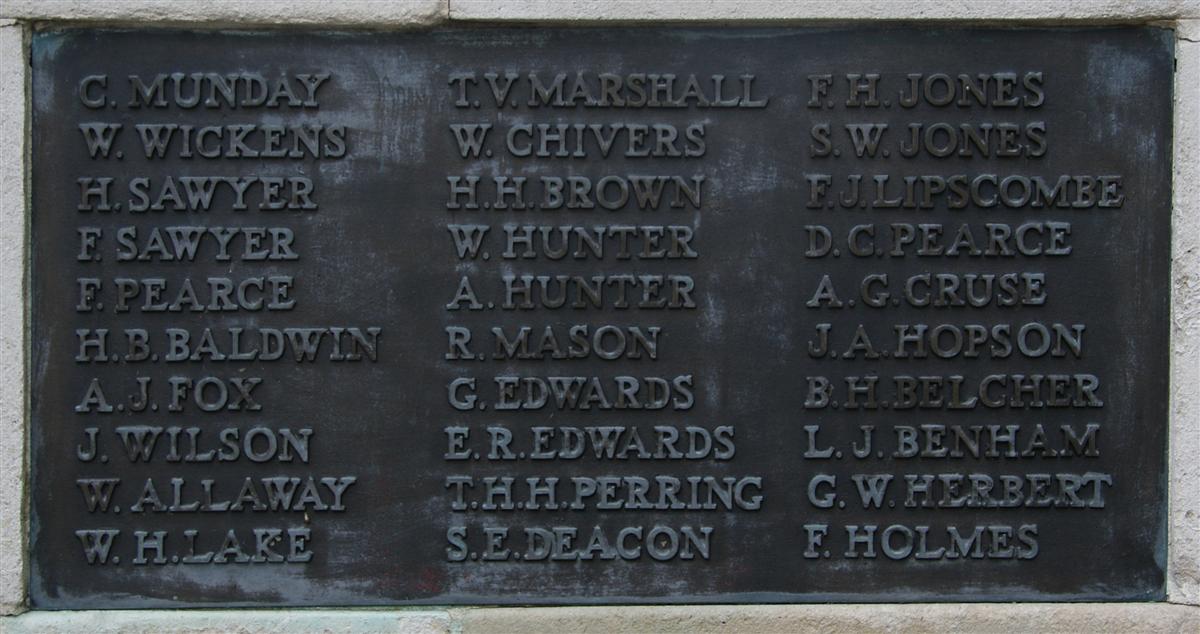Horace Benjamin Baldwin
Driver 500201 Horace Benjamin Baldwin, 61st Signal Company, Royal Engineers.
Horace was born in 1896 the son of Benjamin Baldwin and his wife, Alice née Green. Benjamin came from Cholsey, near Wallingford moving to Newbury to work on the railway in 1888. Initially they lived at Washwater on the southern rural fringe of the parish (at 2 Elm Cottages) before moving in 1900 to Railway Terrace near the centre of town.
 Horace Baldwin |
Horace had the sort of military career that is confusing to research in the absence of his service records (around 70% of such records were destroyed during WW2). His medal index card shows three different service numbers: Royal Engineers (Sapper T/1879), Royal Berkshire Regiment (2197), and the Royal Engineers (500201). Normally these entries would be in the order in which the soldier served in the various units; in this case they seem to be out of order.
Horace enlisted with the Royal Berks Territorials (4th Battalion), Newbury Company, before the war. He was too young to serve abroad but responded to the call up in August 1914 and trained with the battalion. He then transferred to the Royal Engineers, still as a Territorial, serving with the Signalling Company that covered the Newbury area, the 2nd Midland Signalling Company. In early 1917 all members of the Territorial units were renumbered in order to remove the confusion caused by multiple units each using their own numbering systems. This was when Horace would have received his final number - 500201.
His Company went to war as the 61st Signal Company, Royal Engineers, part of the 61st Brigade which was attached to the 14th (Light) Division - the 2nd South Midland Division. A signal company was responsible for all aspects of communication between the various elements of the Division. The most effective means of communication was the telephone, which necessitated the laying of miles of cabling – all of which was vulnerable to enemy shelling and in almost constant need of repair, replacement, and maintenance. .The signallers would also use wireless methods of communication, not necessarily radio (which was in its infancy) - semaphore, flags, lights and pigeons were far more commonplace.
 The Baldwin Brothers |
The 14th Division, as part of the Fifth Army. was involved in the infamous Battle of Passchendaele (Third Battle of Ypres) or the Battle of the Mud was it became known by the troops involved. The Fifth Army under General Gough was the main attacking force, aided by a Corps from General Plumer’s Second Army. The battle did not go well with only minor gains being made. Following the phase known as the Battle of Langemarck (16-18 August 1917) Gough’s tactics were discredited and the Fifth Army was moved north, out of the battle and General Plumer was given command of the British attack.
Horace’s death is recorded as the 21 August 1917, during the period when the 14th Division, along with the rest of the Fifth Army would have been relocating north. However, his grave is in a cemetery associated with a number of casualty clearing stations, field hospitals where wounded soldiers would be treated before being moved further away from the front. The cemeteries alongside these Stations demonstrate that they could not save all the wounded men who reached them. Horace evidently died of wounds received earlier, probably during the Battle of Langemarck. His body lies in Mendinghem Military Cemetery, grave IV.F.28.
Horace’s elder brothers Albert, Walter and William also served, fortunately all three survived; all four brothers were pictured in Berkshire at War, a special wartime publication from the Reading Standard, they were also mentioned in the local newspaper of Horace's death:

Horace Baldwin's name on Newbury War Memorial (centre left) |
Newbury Weekly News,
30 August 1917, p8 - Local War Notes
The sad news has been received that Signaller Horace Baldwin, son of Mr and Mrs Benjamin Baldwin, of Railway-terrace, was severely wounded in the head by a shell, and died from the effects on August 21st. The deceased, who would have been 21 years of age in October, was a member of the Newbury Territorial Company when war broke out, and he went into training with the 1/4th Battalion at Chelmsford. He afterwards transferred to the Royal Engineers signal service, and trained on Salisbury Plain. He had been in France 15 months, and was expected home on leave on Saturday. Relatives met the train by which he was likely to arrive. On Monday came the telegram announcing his death. A Newbury comrade, Driver Harry Aldridge, who had been on leave, went to see him on Sunday as he lay wounded. Baldwin was one of the three apprentices in the “Weekly News” office who were called up at the beginning of the war. He was a stalwart lad, and his death is much regretted. There are three other brothers in the Army, Albert, nine years in India; Walter, a sergeant, wounded in the Dardanelles, now on home service; and William, in the Yeomanry, expecting orders for abroad
Locally he is remembered on Panel 3 of the Newbury Town War Memorial.

